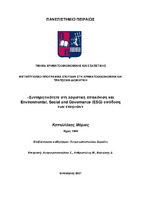Συντηρητικότητα στη λογιστική απεικόνιση και Environmental, Social and Governance (ESG) απόδοση των εταιριών

Προβολή/
Λέξεις κλειδιά
Λογιστική συντηρητικότητα ; ESG απόδοσηΠερίληψη
Η παρούσα εργασία μελετά την επίδραση της λογιστικής συντηρητικότητας στην ESG απόδοση των εταιριών της Ευρωζώνης κατά την περίοδο 2004-2019. Ο λόγος για τον οποίο εξετάζεται αυτή η σχέση έχει να κάνει με την επιρροή των δύο μεταβλητών στην μελλοντική απόδοση μίας εταιρίας. Ως λογιστική συντηρητικότητα ορίζεται η ασυμμετρία στην αναγνώριση των κερδών σε σχέση με τις ζημιές, ενώ ως ESG απόδοση ορίζεται σύνολο των συμπεριφορών μίας επιχείρησης σχετικά με το περιβάλλον (Environment), την κοινωνία (Social) και την εταιρική διακυβέρνηση (Governance). Τα αποτελέσματα της έρευνάς μας παρέχουν στοιχεία σχετικά με μία ισχυρή αρνητική συσχέτιση μεταξύ των δύο εξεταζόμενων μεταβλητών. Φαίνεται ότι αυτή η αρνητική σχέση μειώνεται ως ένα βαθμό όταν η ESG απόδοση υπολογίζεται μέσω μεταβλητών που εφάπτονται στο νομικό πλαίσιο των επιχειρήσεων. Επίσης, παρέχουμε στοιχεία σχετικά με το πως αυτή η σχέση διαμορφώνεται με βάση τη μακροοικονομική κατάσταση μίας χώρας και την κουλτούρα της. Χώρες οι οποίες δεν αντιμετώπισαν μεγάλες δυσκολίες στην οικονομική κρίση του 2009 παρουσιάζουν μικρότερη αρνητική συσχέτιση συγκριτικά με εκείνες που πλήχθηκαν περισσότερο. Οι χώρες αυτές επίσης, παρουσιάζουν χαμηλότερα επίπεδα συντηρητικότητας πράγμα που υποδηλώνει ότι οι μακροοικονομικές δυσκολίες μπορεί να ωθήσουν μία χώρα στο να γίνει περισσότερο συντηρητική στην απεικόνιση των λογιστικών της καταστάσεων. Επιπρόσθετα, η εργασία μας εξέτασε τη σημαντικότητα του παράγοντα κουλτούρα στη σχέση αυτή. Τα στοιχεία δείχνουν ότι χώρες με μακροπρόθεσμους προσανατολισμούς παρουσιάζουν υψηλότερα επίπεδα συντηρητικότητας σε σχέση με τις χώρες που χαρακτηρίζονται από βραχυπρόθεσμους. Παρόλα αυτά, η μεγαλύτερη συντηρητικότητα δεν τις οδηγεί σε ακόμα μικρότερη ESG απόδοση καθώς φαίνεται ότι η κουλτούρα αποτελεί ένα σημαντικό παράγοντα που διαμορφώνει την ένταση της αρνητικής σχέσης μεταξύ των δύο εξεταζόμενων μεταβλητών. Συνοψίζοντας, η εργασία παρέχει στοιχεία σχετικά με μία ισχυρή αρνητική σχέση μεταξύ συντηρητικότητας και ESG απόδοσης, η οποία εντείνεται σε χώρες με μακροοικονομικές δυσκολίες και φαίνεται ότι επηρεάζεται από τον μακροπρόθεσμο ή βραχυπρόθεσμο προσανατολισμό που τις διακρίνει.


